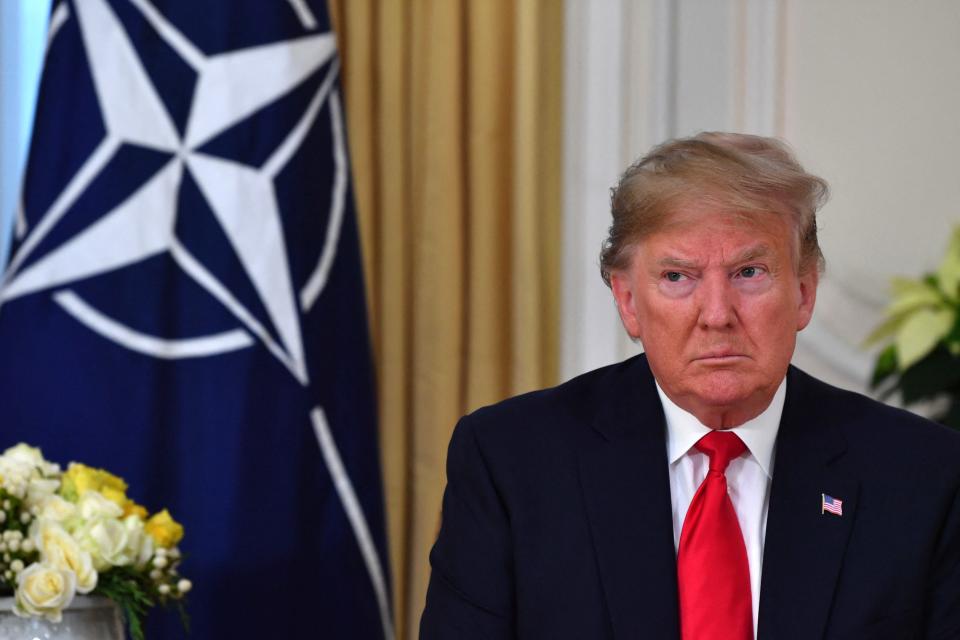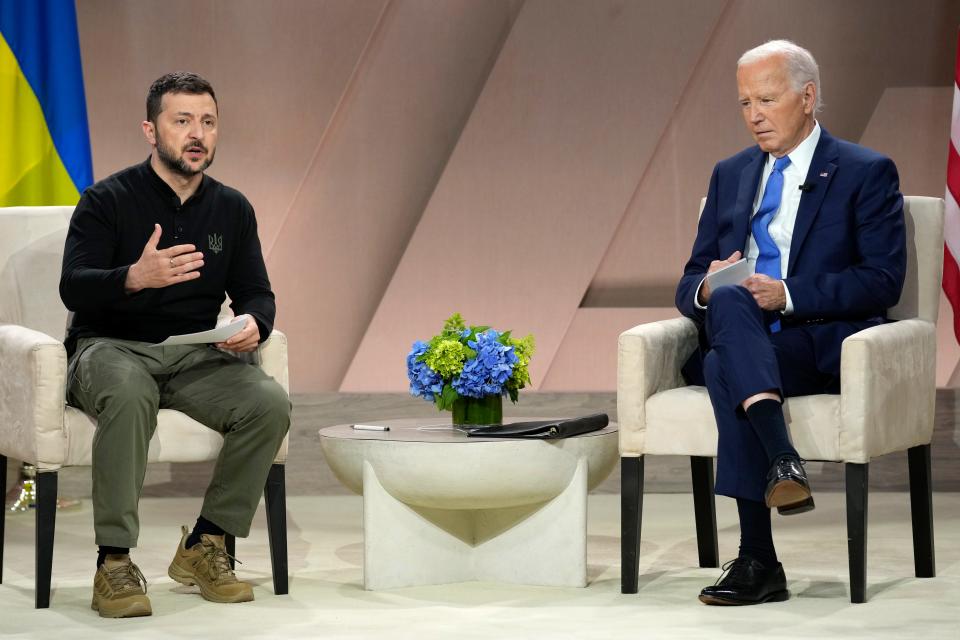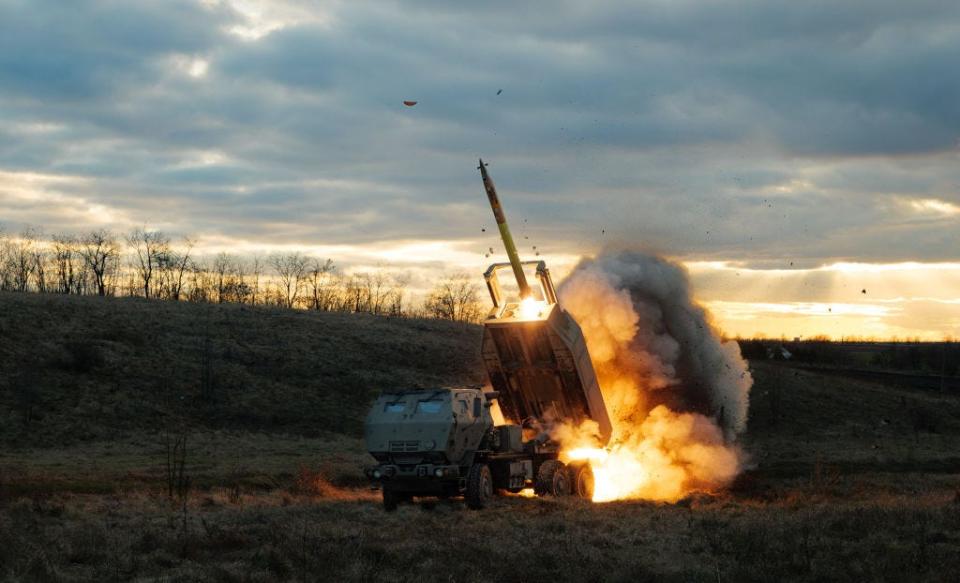NATO is taking greater control of Western efforts to back Ukraine's fight as US politics raise questions about its reliability
Past political gridlocks and the upcoming US presidential election have fueled concerns over future Ukrainian military aid.
Donald Trump, a critic of NATO, has questioned the large amount of support the US gives Kyiv.
NATO has a new initiative underway to keep the assistance flowing over the long run.
NATO is moving forward with a new initiative that will see it take greater control over Western efforts to arm and train Ukraine's military. The move comes as the alliance aims to solidify the long-term support for Kyiv as it battles the Russian invasion.
The development also comes as uncertainty surrounds American reliability. It follows a political fight in Congress that jammed up critical aid for months and comes ahead of a pivotal US presidential election, which could see former president Donald Trump — an outspoken critic of NATO and some of its allies and a skeptic of the large amount of security assistance that has been sent to Ukraine — back in the White House.
Growing concern about the potential change in US leadership has hung over the highly consequential NATO summit in Washington this week.
Top government officials from various allied countries insist that they are ready to work with whichever administration is in the White House come November, but ensuring that Ukraine will continue to enjoy lasting Western support is a significant priority.
Allied governments on Wednesday signed off on the decision to establish the NATO Security Assistance and Training for Ukraine, or NSATU, to coordinate the future supply of military aid and training for Kyiv.

This new NATO initiative's "aim is to place security assistance to Ukraine on an enduring footing, ensuring enhanced, predictable, and coherent support," the allies said of the initiative in their summit declaration.
"NSATU will not, under international law, make NATO a party to the conflict," they said, explaining that the purpose is to "support the transformation of Ukraine's defense and security forces, enabling its further integration with NATO."
How it works
NSATU will be headquartered in Germany with several logistics hubs along the alliance's front — in Poland, Romania, and Slovakia — and include a staffing of around 700 people reporting to a three-star general.
The initiative will focus on coordinating the training of soldiers, facilitating the delivery of equipment, and future force development on behalf of allies, and it is expected to roll out over the following months.
A NATO official who spoke to reporters Thursday on the sidelines of the summit said that the idea for the new initiative began to formulate earlier this year. The alliance essentially sought to "cohere" all the different ways that Ukraine has been supported throughout the war to make the different efforts more consistent and sustainable in the long run.
The new NSATU program will not replace the US-led Ukraine Defense Contact Group, a coalition of nations that has met regularly for more than two years to coordinate the surge of security assistance from other countries to Kyiv. The NATO official said this group is more of a "diplomatic" forum.

"What we're aiming for with Ukraine is to get a certain set of its forces interoperable with NATO," the official said, adding that "if it was not wartime conditions, and if resources were unlimited, then maybe we could achieve that within the course of five, eight years — something like that."
"But during wartime, it's very difficult," they said.
Beyond NSATU, the alliance is also taking other steps to ensure long-term military equipment, support, and training for Ukraine — including a pledge of at least $43.4 billion in security assistance within the next year. They also announced the transfer of additional air-defense systems at the onset of the summit, a day after Russian missile strikes killed dozens of people in Ukraine and destroyed part of a children's hospital in Kyiv.
The Trump factor
The new initiative is NATO's attempt to help keep support flowing to Ukraine and has been referred to as a so-called way to "Trump-proof" long-term military aid should he win the upcoming presidential election. To what extent that's the case is unclear, but the former president's rhetoric has, at times, triggered concern.
"A big reason for the change is to Trump-proof the assistance effort to Ukraine," Ivo Daalder, the former US ambassador to Ukraine, told the Wall Street Journal recently.
"Rather than having Washington in charge of managing the training and assistance, NATO will be in charge," he said, explaining that "even if the US reduces or withdraws support for the effort, it won't be eliminated."

Trump has previously criticized NATO countries for not spending enough on defense, even going as far as to say that not only would he not protect countries not meeting their spending goals, but he would also encourage Russia to do whatever it wants with them.
The former president has also threatened to cut off military aid to Ukraine and has criticized its president, Volodymyr Zelenskyy, for lobbying efforts to secure more support.
The US has provided over $53 billion in security assistance to Ukraine since the start of the full-scale war, which is more than any single European country — one of Trump's grievances. However, according to the Kiel Institute for the World Economy, European countries have collectively spent some $30 billion more than the US in support of Ukraine, underscoring the monumental effort across the continent to assist Kyiv.
Allies will undoubtedly be closely watching the high-stakes US election in the fall, and no matter who wins, they are certain to say that they intend to work with Washington so that it will continue to invest in European security — which they assert is ultimately dependent on the outcome of the Ukraine war.
There is no "safe and secure" Europe without US support, Laurynas Kasčiūnas, Lithuania's defense minister, said at an event hosted by Politico and German television outlet Welt on Tuesday. "We should be prepared to work with" Republican or Democratic leadership.
"There are 32 countries in the alliance," the NATO official who spoke on the condition of anonymity said Thursday. "Governments change on a regular basis, and the NATO work continues."
Read the original article on Business Insider

 Yahoo News
Yahoo News 
